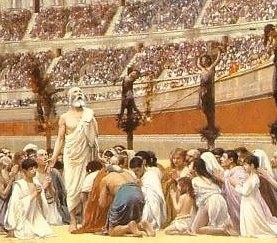 REFORMATION DAY- 494th ANNIVERSARY
REFORMATION DAY- 494th ANNIVERSARY
“Get over it!” “The Reformation was a historical event that took place years ago; it is irrelevant to me and to modern people.” “Just give me Jesus and I will be happy. What good could come from revisiting the teaching of the Reformation in today’s church?” “I’m interested in what Jesus is doing today.”
These are some of the initial comments one is likely to get from other well-meaning Christians unfamiliar, uninformed, and/or disinterested in the Reformation of the 16th century. Yet, what God did in His goodness during the Reformation was nothing less than the reestablishment of the gospel, the good news of salvation in Jesus Christ, that had been eclipsed by the supposed good works of men.
The Reformation was a time when God allowed light to shine in the darkness of the failed attempts of feeble and sinful men trying to earn righteousness from good works, and only ending in despair before a holy God. In the Reformation, God allowed his grace to come again into glorious sight, so that one could truly know how to be made right or at peace with the living God.
How IS a sinful person to be made right before a holy God?
The Holy Spirit through the light of the Scriptures illumined minds and hearts and reminded needy sinners about salvation, hope, and true life found only in Jesus Christ and his righteousness. The Reformation of the 16th century was a powerful work of the Holy Spirit, and a tremendous revival that awakened the church to the centrality of Christ and His Gospel.
What can the Reformation teach us today? Everything! If we are interested in knowing how we can stop “trying harder” and beating ourselves up when we fail, and learn to rest in the righteousness of Christ alone! What we can learn from the Reformation today is to stop saying “I’ll try harder” and begin saying “CHRIST for me, for me, for me”!
Luther’s Reformation
This week is the 494th anniversary of the beginning of the Reformation. On October 31, 1517, a young pastor and Bible teacher in Wittenberg, Germany posted 95 Theses (or “things he wanted to discuss with other pastors and teachers in the church”) on the door of the Castle Church in his home town. Not intending anything other than a discussion with other pastors and teachers, Martin Luther was used by God to begin a reformation of the church by returning to the foundation of Scripture alone. Through the recent invention of the printing press, Martin Luther’s 95 Theses were published and literally spread throughout the world; as we would say today, Luther’s message “went viral”.
Luther had learned that the Bible taught that salvation was not sold by indulgences, or man’s contributed good works, but that grace was God’s alone to give. The Pope at the time of Luther was audaciously offering salvation, hope, and the chance for Uncle Buck to get out of purgatory if the people of the town would pay the right price. Luther’s ’95 Theses’ questioned the authority of the Pope to be able to offer salvation, hope, or redemption for money. These 95 things Luther wanted to discuss caused Luther to seek ultimate authority for the church in the Scriptures and not in the whims of popes and councils, because both had erred; Scripture alone was to be the Church’s ultimate authority and sole rule of faith.
What came from this study of Scripture alone, and asking what Scripture taught concerning man’s salvation, hope and life in Christ, was the realization and experiencing of true salvation, real hope, and the abundant life found only in Christ. The doctrines, or teachings of the Reformation established upon, and found in Scripture alone were: faith alone, grace alone, Christ alone, to the glory of God alone (known today as the ‘Solas’ or the five watchwords of the Reformation: Sola Fide, Sola Gratia, Solus Christus, Soli Deo Gloria based upon Sola Scriptura).
Righteousness Revealed from God
What Luther discovered when going to the Scriptures alone was that a righteousness had been revealed from God, not from within himself or from external works, but a righteousness that God provided for all who believe in Christ. God who demanded perfect righteousness of every single human being for salvation and communion with Him, also had provided this perfect righteousness in Jesus to be received by faith alone (Romans 1:17).
ESV Romans 1:16-17: For I am not ashamed of the gospel, for it is the power of God for salvation to everyone who believes, to the Jew first and also to the Greek. For in it [the gospel] the righteousness of God is revealed from faith for faith, as it is written, “The righteous shall live by faith.”
Salvation was found by going to Christ, not by going through the motions of external obedience. This righteousness of Christ was received by faith alone. Christ had a perfect righteousness that we could never obtain as sinners. This is why the Apostle Paul writes (Romans 4:4-5, 8:
“Now to the one who works, his wages are not counted as a gift but as his due. And to the one who does not work but trusts him who justifies the ungodly, his faith is counted as righteousness… “Blessed is the man against whom the Lord will not count his sin”.
The grace of God was not something man could cooperate with as in the Medieval Roman Catholic theology (as well as in some Evangelical circles today), it was all of grace (Eph. 2:5-10). Grace alone meant that man’s will was in bondage to the flesh, the world and the Devil and the only way that the will could freely choose Christ was for the heart to be regenerated, awakened from the dead, pass from death to life, and this all by grace so that no one could boast, as Paul teaches in Ephesians 2.
ESV Ephesians 2:4-10: But God, being rich in mercy, because of the great love with which he loved us, even when we were dead in our trespasses, made us alive together with Christ- by grace you have been saved- and raised us up with him and seated us with him in the heavenly places in Christ Jesus, so that in the coming ages he might show the immeasurable riches of his grace in kindness toward us in Christ Jesus. For by grace you have been saved through faith. And this is not your own doing; it is the gift of God,p not a result of works, so that no one may boast. For we are his workmanship, created in Christ Jesus for good works, which God prepared beforehand, that we should walk in them.
Christ alone was the only Mediator (1 Tim. 2:5), our only Savior and Substitute for sin (Romans 5:10; 2 Corinthians 5:21). The truth of Christ alone was summarized in 1 Corinthians 1:30 and 2 Corinthians 5:21:
1 Corinthians 1:30 He is the source of your life in Christ Jesus, whom God made our wisdom and our righteousness and sanctification and redemption.
2 Corinthians 5:21 For our sake he made him to be sin who knew no sin, so that in him we might become the righteousness of God.
In the Scriptures above from Paul’s Letters to the Romans, Ephesians, and Corinthians, notice the fullness of Christ’s saving work: God made us alive while still dead in sin (Eph. 2:4). Because we are dead and lack any kind of righteousness before God, Christ is our righteousness, sanctification, and redemption (1 Cor. 1:30). Christ’s righteousness, not ours is our merit before a Holy and Just God. Christ alone is our holiness or sanctification and He is the One who has paid the ransom price by His precious blood to purchase us back and make us children of God.
Also notice the substitutionary quality of Christ alone: Jesus became sin (He who knew no sin). In other words, our sins were laid on his back and he was cursed for us (for us, for us, for us!!! Shout it loudly wherever you are!). His righteousness would cause us to become the righteousness of God through imputation. The perfect righteousness of Christ was imputed to us! This is what Christ alone meant! (2 Cor. 5:21)
And all of this salvation in Christ was for the glory of God alone!
As Romans 11:36 says: “From Him and through Him and to Him are all things, to God be the glory forever and ever!” Our salvation is all for the praise of HIS glorious grace, as Paul teaches in Ephesians 1!
Today’s Reformation
We have a great need for a Reformation today in Christ’s Church as well! We may not have neighbors selling indulgences and literally trying to buy their way out of hell (although you will find some who are sadly doing this).
What we do have today are well-meaning folks who call themselves Christians who are focusing more on what they do for Christ, than what Christ has done for them. Even though the intention is good, the bracelets some wear with the phrase “What Would Jesus Do” (WWJD) seem to focus too much on our doing and not what Christ has already done! Even if you don’t have this slogan on your wall, and don’t wear a bracelet on your arm, your hope and confidence before God is based on what you have done for God more than what Christ has done for you often times.
Be honest about this. Then look to Christ for hope. What a loving and beautiful Savior that calls us constantly to come to the Throne of Grace and find mercy and hope and grace in our time of need (Heb. 4:16)! Christ can give us relief from our selves; Christ can show us His precious and costly blood that has redeemed us; Christ prays for His people with nail-pierced hands that earned righteousness for us and in this we can hope and have great confidence!
I believe that the main focus for Christians every day should be the centrality of Christ and His work for us. In other words we might have a slogan like this (rather than ‘What Would Jesus Do?”): “What Has Jesus Already Done in His Life, Death, Resurrection, and Ascension for Me?”, but then it would be too long of a phrase for a bracelet or a nice bumper sticker; it would be:
“WHJADIHLDRAAFM?” rather than “WWJD?â€
Probably not an easy sell or an easy fit on a nice porcelain figurine in a Christian book store. 🙂
Remember beloved of God: “It is well with my soul” because “It is finished!” not because “It is about me and my attempts at righteousness”. We need Reformation today! It is well with your soul because of Christ’s finished work of satisfying God’s wrath for you; it is finished because Jesus has offered Himself as the Lamb of God, the Final Sacrificial offering for sin and is able to save to the uttermost those who come to God through Him (Heb. 7:25). It is well and it is finished because Jesus was your substitute and God made Jesus who knew no sin to become sin for you, so that you might be righteous in His sight (2 Cor. 5:21). God put Jesus forward as your propitiating sacrifice. Praise God!! Hallelujah!!
Now go and live for JESUS freely as you never have! Go and live and love JESUS AND OTHERS as you never thought you could. Because you couldn’t before because you thought it was your strength, and your works, and this is burdensome and will not lead to love of God and others, but only discouragement, condemnation and doubt!
Go live for Him and be thankful for a Savior- -not merely a helper for good people- -but a real Savior for sinners, who were once enemies of God before they were reconciled by Christ’s grace! (Romans 5:1-11).
It is true that there are some in our day- – these who call themselves Christians!- – who think that the reason they are saved ultimately is not because of grace alone, but because they have cooperated with grace held out to them. This was what the fight in the Reformation was all about! Medieval Roman Catholic theology is quite complex, but it is foundationally a system of earning salvation by cooperating with grace held out to men, who then respond with their faith, and then salvation is merited to them because of their faith, or because of their works, etc.
We focus on the gorgeous and fantastic Greek word “huper” but point it to Christ! What does this mean? “Huper” means “because of” or “on account of”. We are not saved “huper” or “because of” our faith or our works. But we are saved (“Super-Huper Saved!!) “HUPER” or “because of” Christ. Christ saves us through faith.
If Evangelical Christians in our day would stop and think about it, I think they would find their theology to be more Roman Catholic than they would like to admit! The term ‘Protestant’ used to mean that one was opposed to this Medieval theology of salvation by cooperation, but today’s Evangelical Protestant is not so much protesting this way of false salvation as much as they are protesting the Reformed way of thinking. At one time to be a Protestant meant you were protesting a false hope held out to you. Now it seems to mean in many circles that I am protesting against believing what the Reformation taught about grace alone.
We must be warned that this teaching that says you are saved by cooperating with the grace of God will never produce the humility a Christian must have to know and love God. This kind of “cooperation salvation” makes people boast! It gives people in this world every reason to boast, which is what Paul is trying to prevent in Ephesians 2 where he is explaining grace alone.
If (and I do say “IF”) every person in the world had the same access to grace and the same ability to cooperate with that grace using their so-called ‘free-will’, it would give one person who chose Christ over someone who rejected him every reason to boast. This is the most popular understanding today in Evangelical circles of how someone is saved! Because there is a reason to boast, it therefore undermines the grace of God and promotes the good works, will, and decisions of men (cf. John 1:12-13; Romans 9:10-21). We need Reformation today!
Also, when Christians are brought up and “nurtured” on a diet of “Christ and you” rather than “Christ in you” (which is the hope of glory, Col. 1:28ff), then we are reminded that we have need of a Reformation. When many sermons every Lord’s Day are on examples from Scripture rather than being centered on the Christ of Scripture, men will “dare to be like Daniel’s” while failing to truly know what it means to trust Christ alone, the very Savior of Daniel! The Scriptures speak of Christ (John 3:30; 5:24ff; Luke 24:25ff), and so must we- – speak of Christ alone! We need Reformation today!
When our worship becomes just another opportunity for mindless entertainment rather than focused on God alone and his glory, we can forget that worship is about HIM and not about us. When we are thinking more about “what we are getting out of the sermon” and whether it is meeting our “felt needs”, we are not worshipping in spirit and truth!
Furthermore, when we reach out to the goats and design our worship to make them feel comfortable, we are failing to reach the sheep and failing to hear the true voice of our Shepherd (John 10). Jesus says as Shepherd that His sheep hear his voice in faithful preaching and they will follow him! We must be reminded about all things being done for the glory of God alone- – and not for us (including our salvation- – of course we benefit, but according to Ephesians 1 and Romans 9, salvation is ultimately for God’s glory!) We need Reformation today!
Revival and Reformation
So, in our day, we need to be reminded of the Reformation! If we want revival, we ought to first seek the Reformation of our congregations so that we might return to the foundational authority of Scripture alone and not add a lot of our own modern and “culturally relevant” teachings of men (which we tend to as idolaters, to place on the same level as Scripture just as the Pharisees, or the Medieval Church of Rome which Luther stood against).
We need to return to Scripture alone and rediscover daily the glorious teaching of faith alone- – our righteousness is not our own, but revealed by God to us so that we can have an ‘alien righteousness’ or the righteousness of Christ given to us.
In other words, the good news of Faith alone is that all that we have done in our sins against God, both committing sins positively against him as well as negatively omitting certain things we should have done, Christ has done all of these for us (for us, for us, for us! Shout it again!).
Salvation **is** by works- – but not ours (our works are never good enough) — our salvation is by the work of Christ for us and His earned and merited righteousness, because of the salvation he achieved by loving God with all his heart, soul, mind and strength, and his neighbor as himself. This is given to us by faith alone (and this makes us have really “good news” and hope for the world!).
The Reformation in Our Own Hearts
From this realization of Faith alone, we are reminded daily that it is all of grace alone because of Christ’s work alone, and this all for God’s glory! May we be delivered daily of the Medieval mindset of trying to earn our salvation, even in the sense of cooperating with God. May we be delivered from looking to our failures as well as our successes rather than looking away from both to Christ.
May we find that making lists and checking them twice is a Medieval way, as well as an Old Covenant way to failure, and the a fast and broad way that leads to destruction. Remember, those who make lists come to Christ and say: I prophesied, preached, witnessed, cast out demons and did might works in your name. Christ says to those trusting in their lists “Depart from me – -I never knew you!” (Matt. 7:23ff; 25:41ff).
Jesus says: On that day many will say to me, ‘Lord, Lord, did we not prophesy in your name, and cast out demons in your name, and do many mighty works in your name?’ And then will I declare to them, ‘I never knew you; depart from me, you workers of lawlessness.’
“Workers of lawlessness†are those who approach a holy God with their own works, rather than crying empty-handedly: “Lord, have mercy on me a sinner- – for Christ sake alone!â€
The one who understands grace that is truly gracious is the one that stands before Christ and says: “Nothing in my hands to I bring, simply to your cross do I cling!”
In Philippians 3:4-12, the Apostle Paul gives his list for his confidence in the flesh, then proceeds to discard it. May you discard whatever list you have, whatever thing other than Christ you are trusting in and receive daily by faith the righteousness revealed in Jesus.
Philippians 3:4,7-9: though I myself have reason for confidence in the flesh also. If anyone else thinks he has reason for confidence in the flesh, I have more…But whatever gain I had, I counted as loss for the sake of Christ. Indeed, I count everything as loss because of the surpassing worth of knowing Christ Jesus my Lord… That I may gain Christ and be found in him, not having a righteousness of my own that comes from the law, but that which comes through faith in Christ, the righteousness from God that depends on faith…”
May we not make lists of our own, whether it be our successes leading to self-righteousness, or lists of failures leading to our condemnation, discouragement, and depression.
But may we be as Paul who, putting his lists behind him, who pressed forward to know Christ. Read Philippians 3 carefully again, and remember that this truth will set you free of list making and law keeping that has more in common with Medieval Catholic theology (that Luther fought) and Pharisaical theology (that the Apostle Paul considered “dung”).
Look to Christ and discover anew the Reformation of the 16th Century in your own heart of heart. Remember the vital importance of Scripture alone, faith alone, grace alone, Christ alone, to the glory of God alone!
Soli Deo Gloria!
Ephesians 3:20-21: “Now to him who is able to do far more abundantly than all that we ask or think, according to the power at work within us, to him be glory in the church and in Christ Jesus throughout all generations, forever and ever. Amen.”
In Christ’s love,
Pastor Charles R. Biggs








